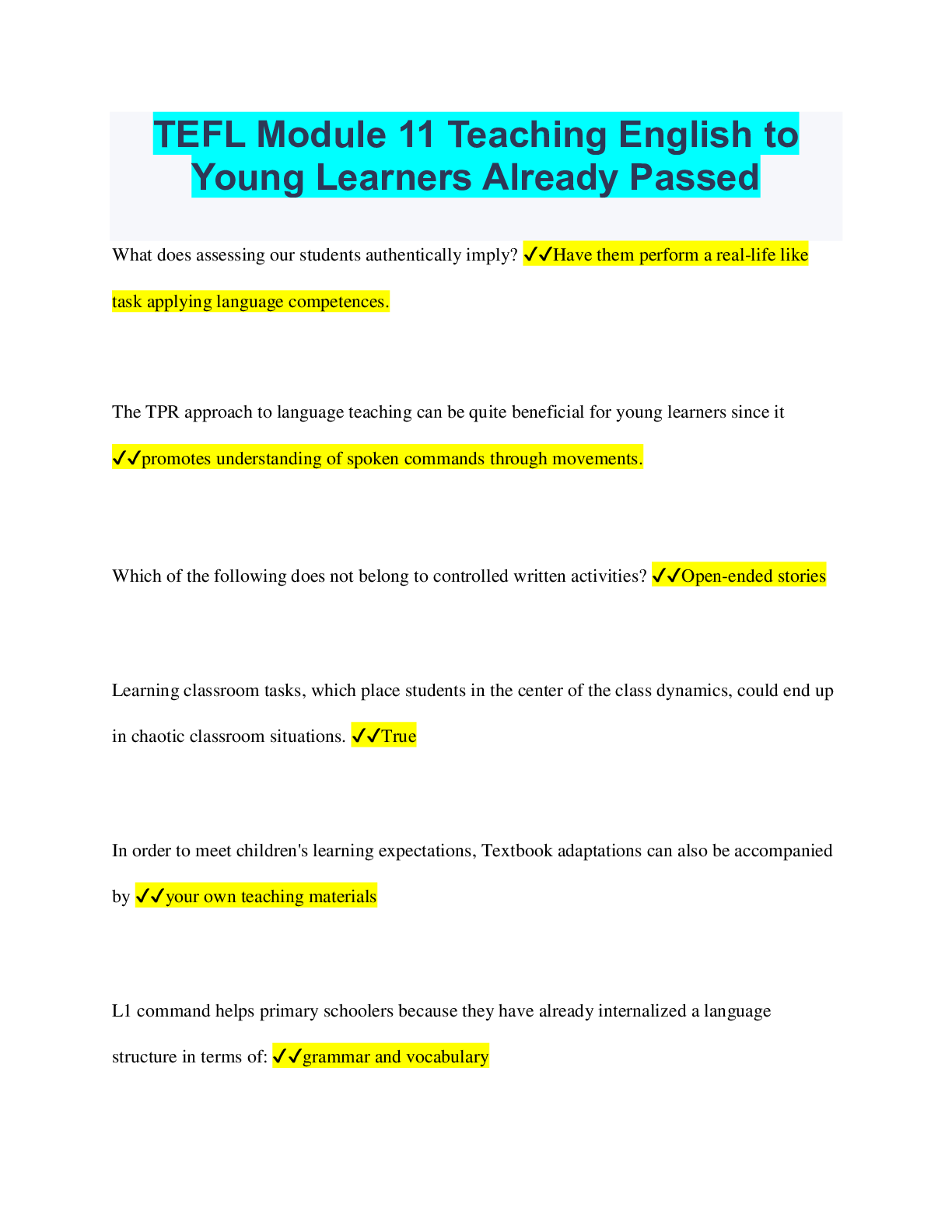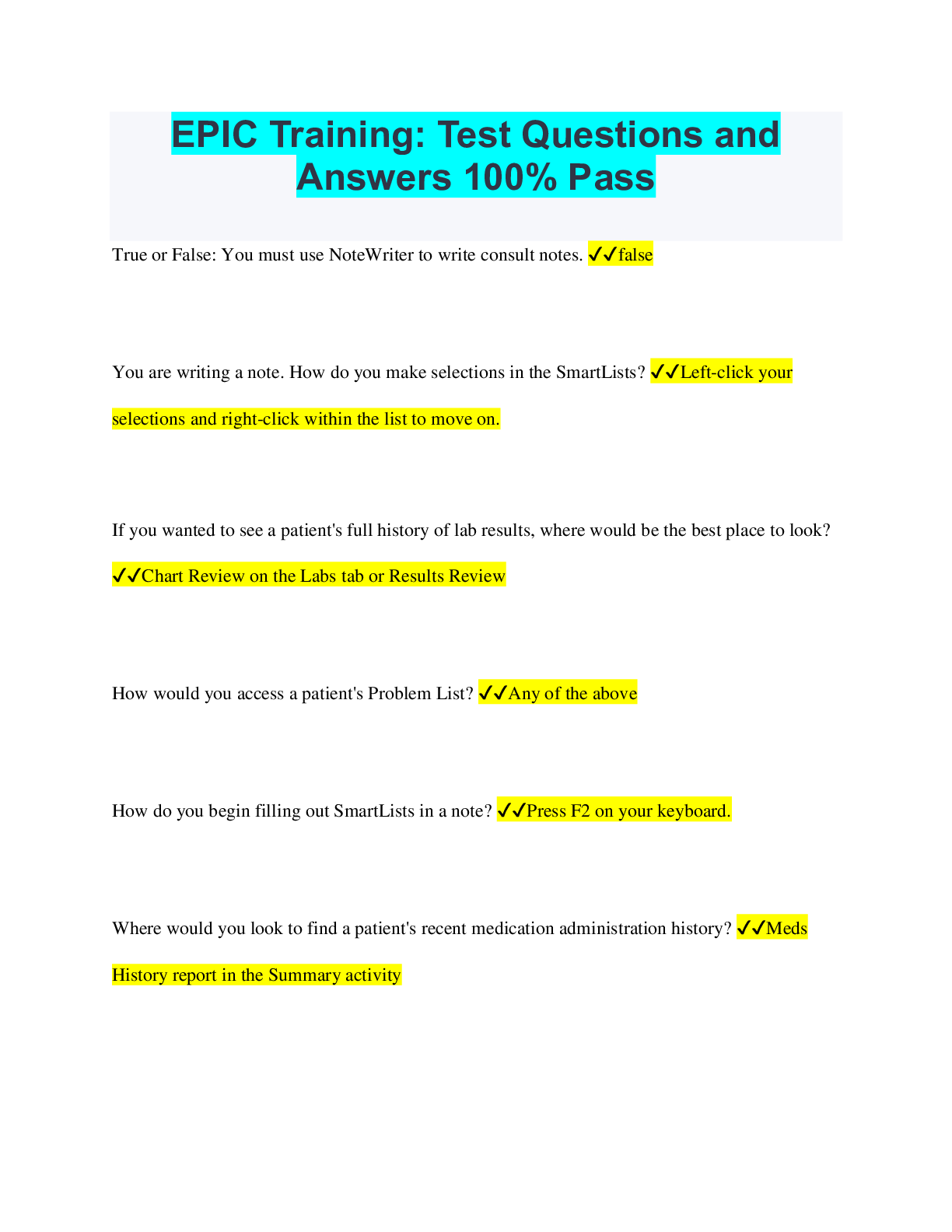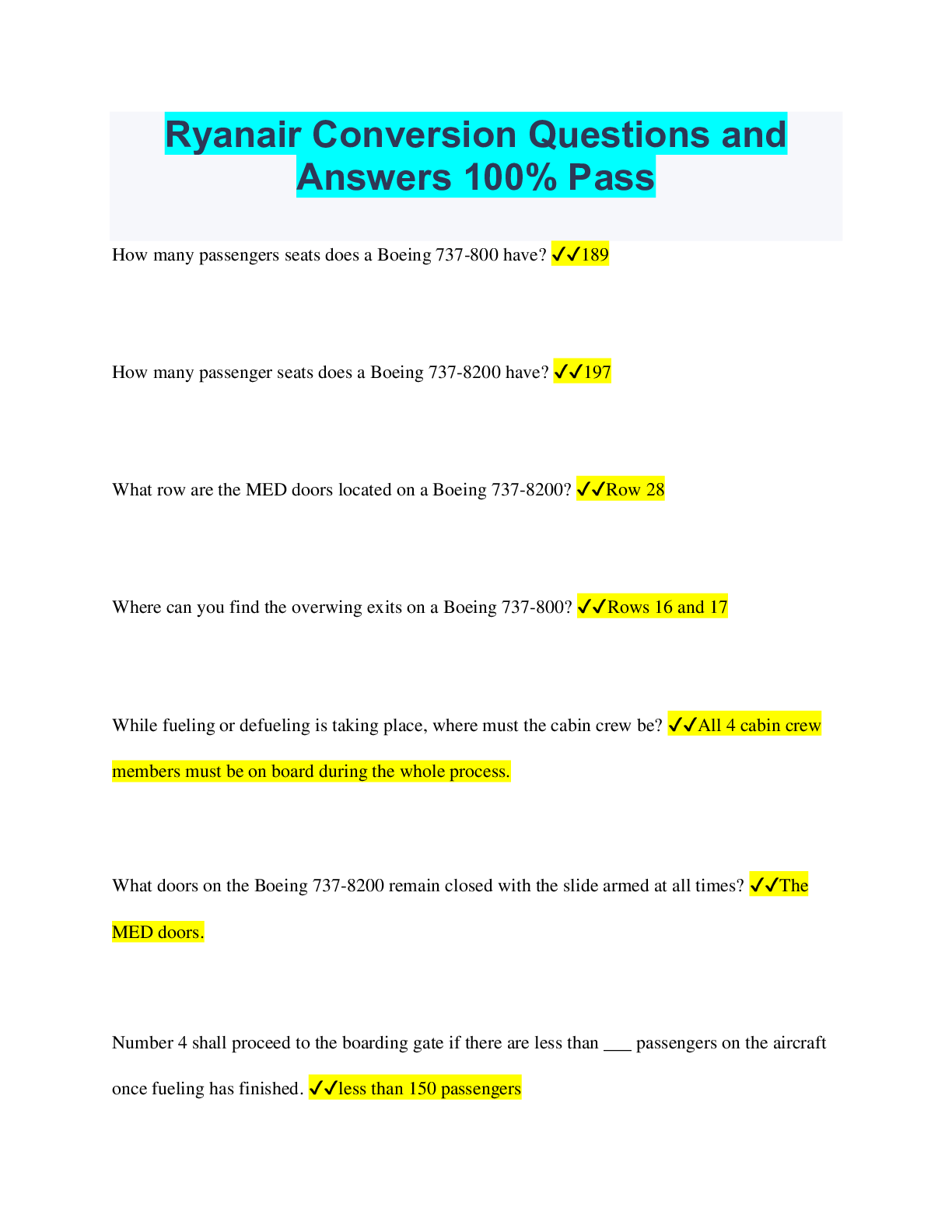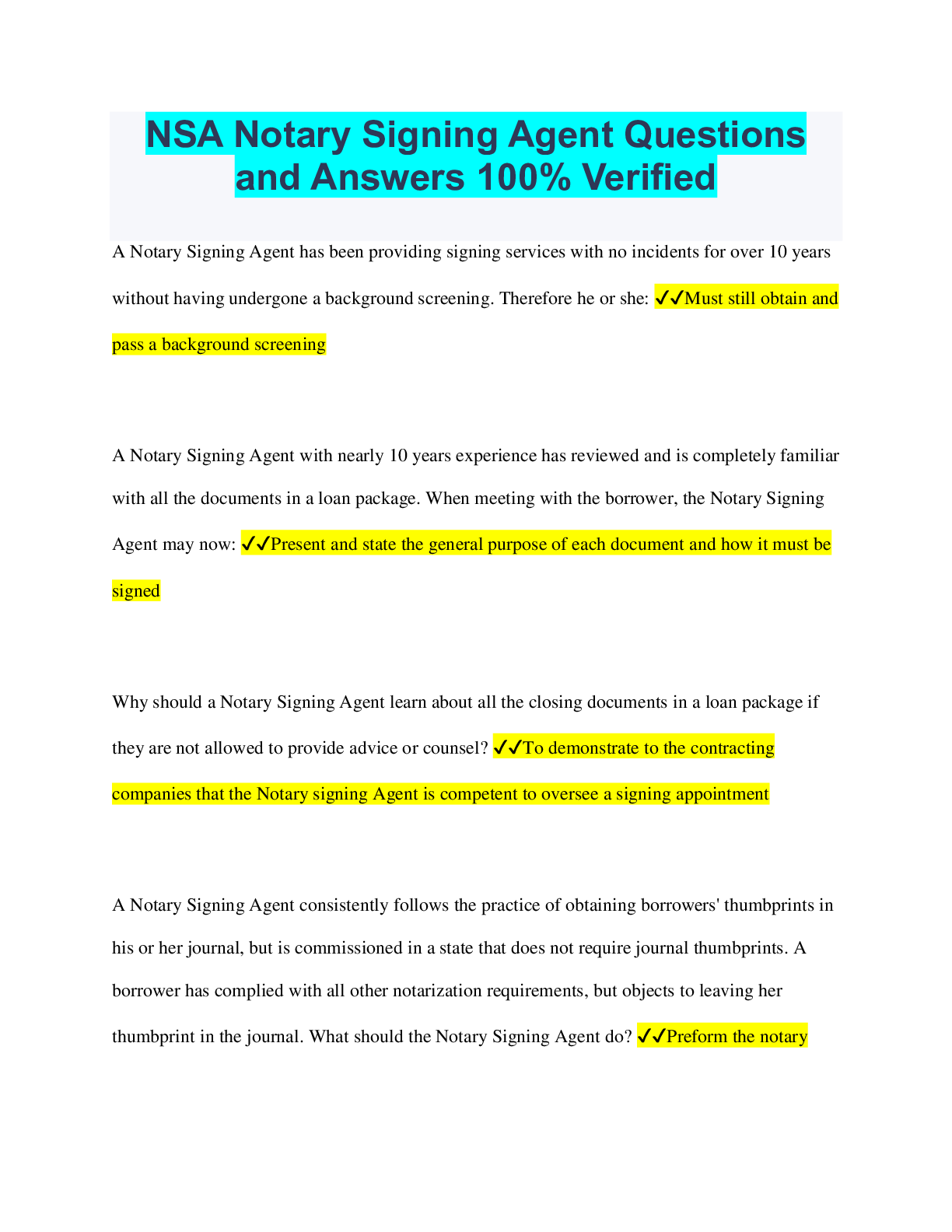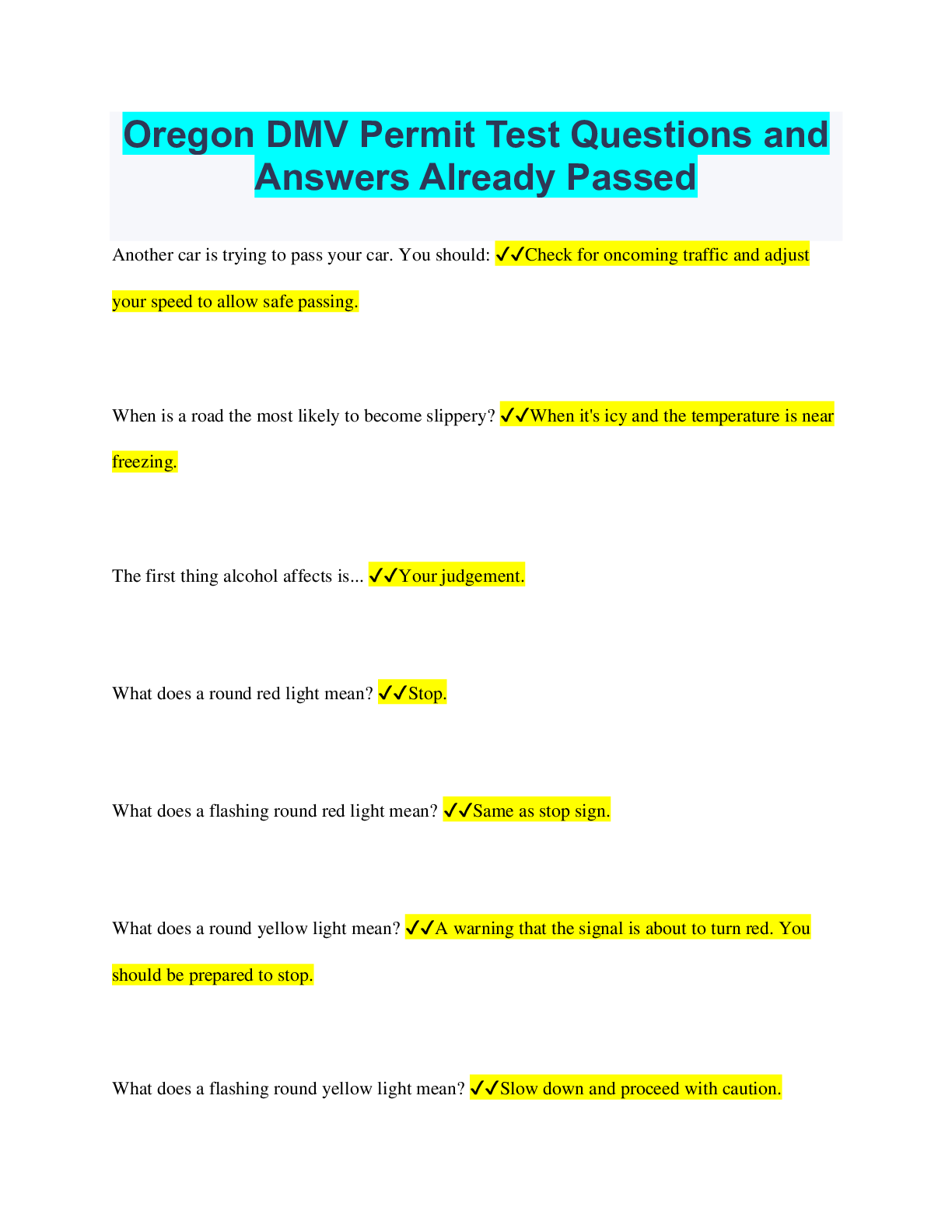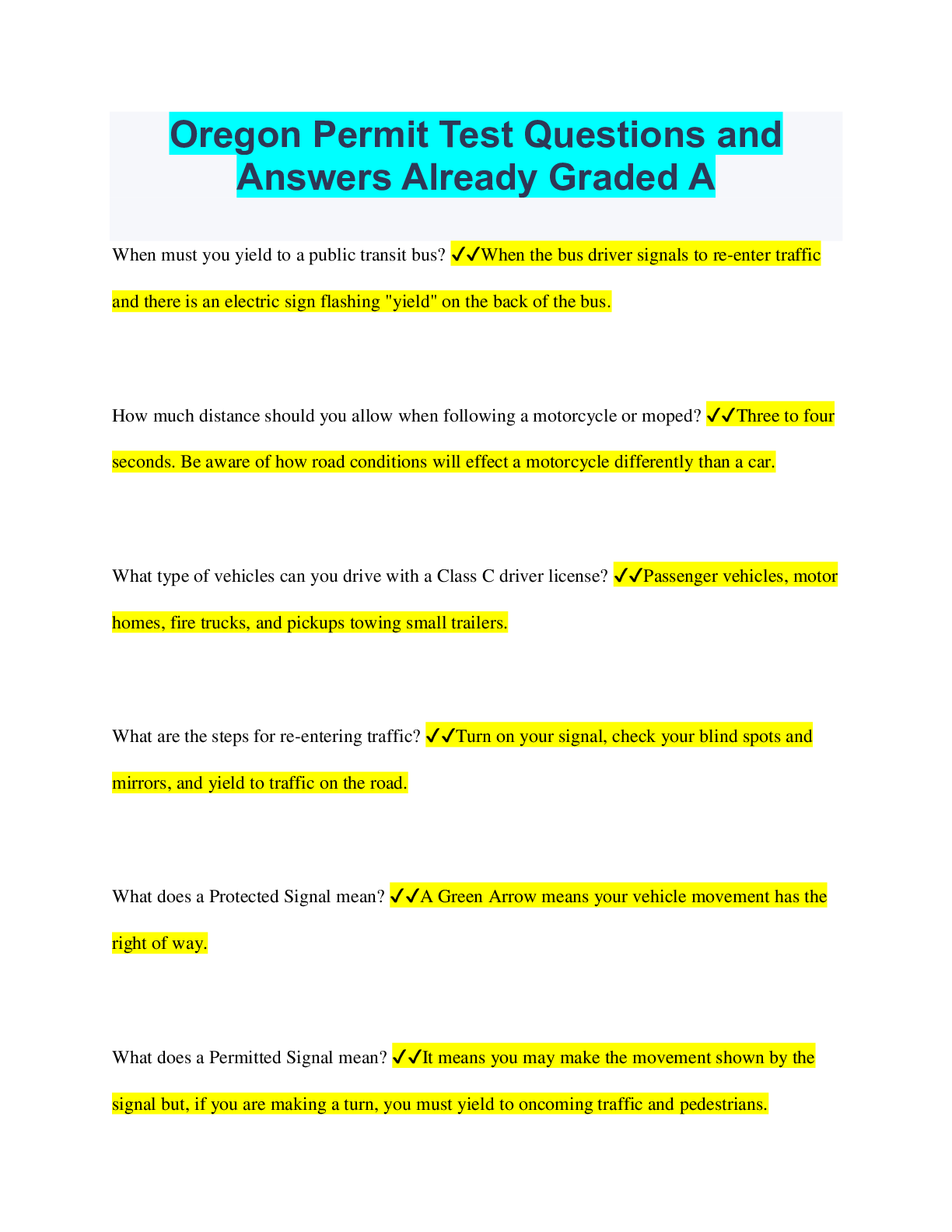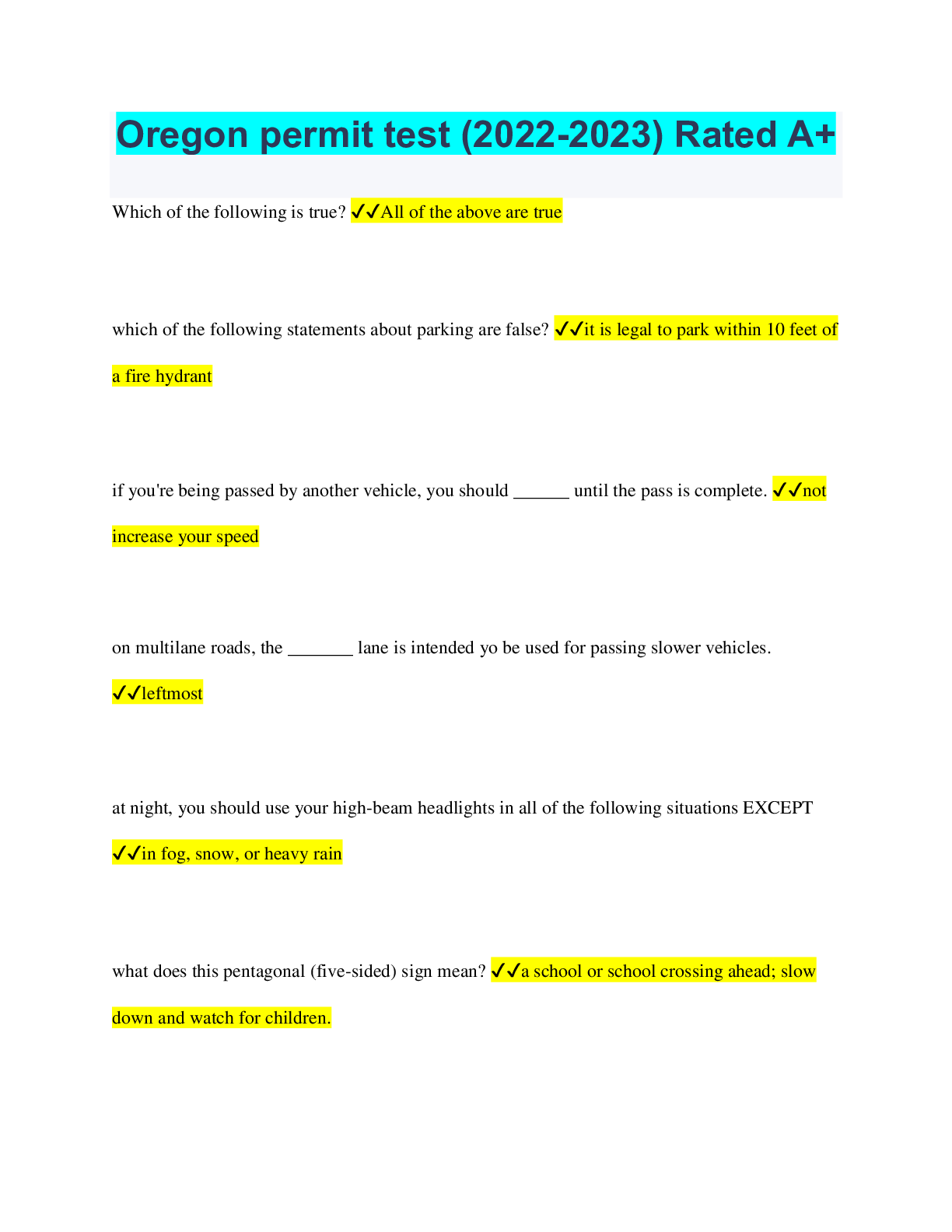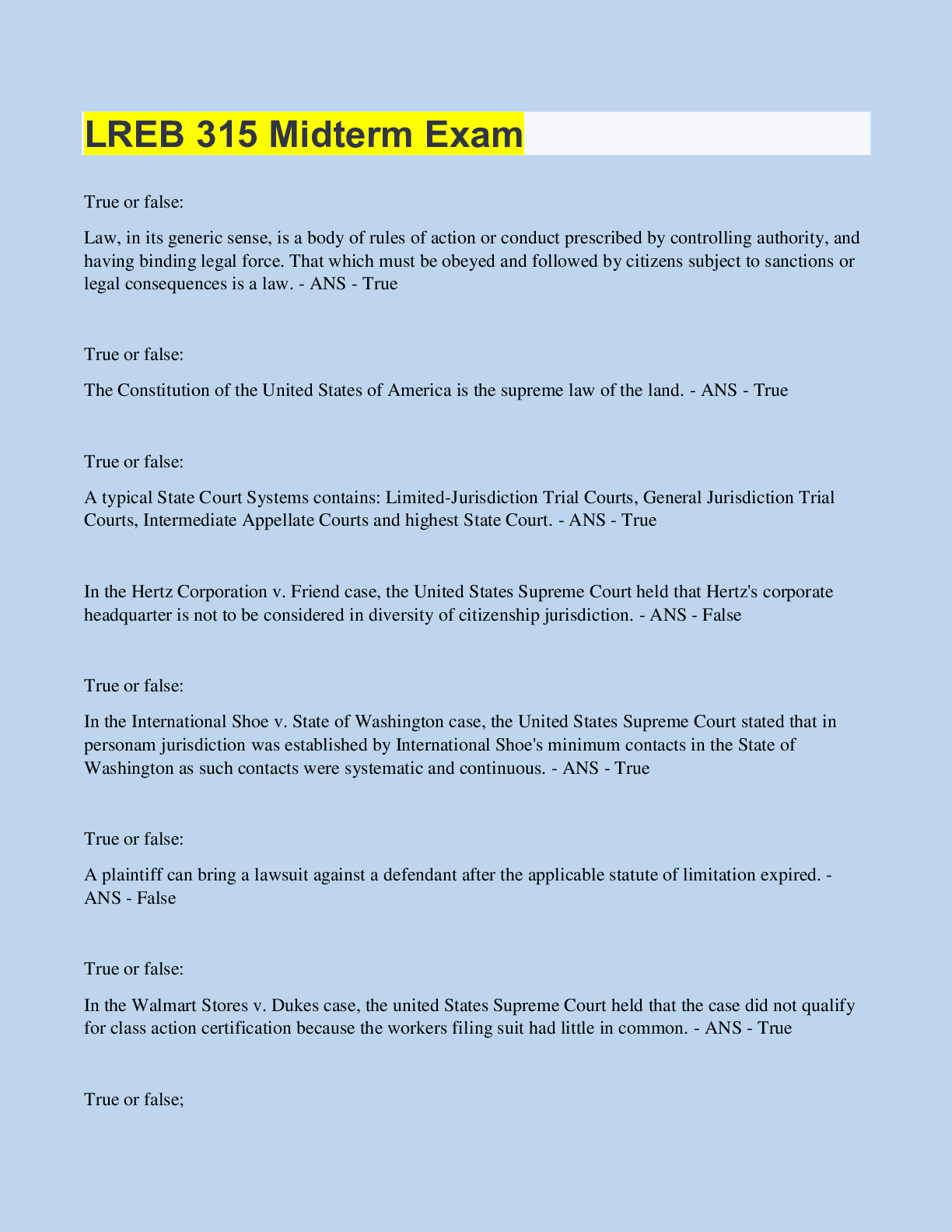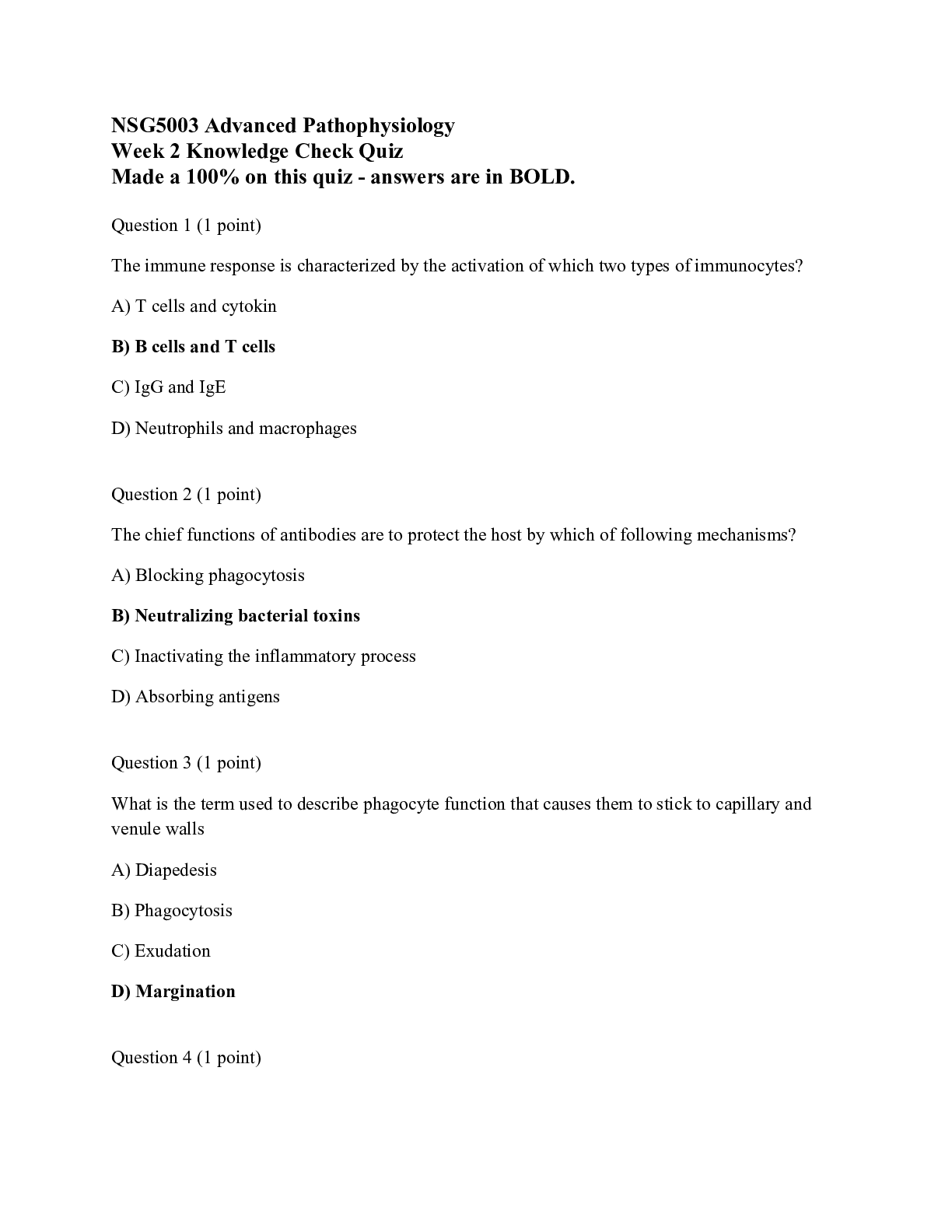Civics > QUESTIONS & ANSWERS > Florida Civic Literacy Exam 2022-2023 Already Graded A (All)
Florida Civic Literacy Exam 2022-2023 Already Graded A
Document Content and Description Below
Florida Civic Literacy Exam 2022-2023 Already Graded A Supreme Court Cases ✔✔Brown v. Board of Education- Brown v. Board of Education of Topeka, 347 U.S. 483, was a landmark U.S. Supreme Court ... decision in which the Court ruled that U.S. state laws establishing racial segregation in public schools are unconstitutional, even if the segregated schools are otherwise equal in quality McCullouch v. Maryland- McCulloch v. Maryland, 17 U.S. 316, was a landmark U.S. Supreme Court decision that defined the scope of the U.S. Congress's legislative power and how it relates to the powers of American state legislatures. Gibbons v. Ogden- Gibbons v. Ogden, 22 U.S. 1, was a landmark decision in which the Supreme Court of the United States held that the power to regulate interstate commerce, which was granted to Congress by the Commerce Clause of the United States Constitution, encompassed the power to regulate navigation. Hazelwood- Hazelwood School District et al. v. Kuhlmeier et al., 484 U.S. 260, was a landmark decision by the Supreme Court of the United States that held that public school curricular student newspapers that have . Gideon v. Wainright- Gideon v. Wainwright, 372 U.S. 335, was a landmark U.S. Supreme Court decision in which the Court ruled that the Sixth Amendment of the U.S. Constitution requires U.S. states to provide attorneys to criminal defendants who are unable to afford their own. Marbury v Madison- Marbury v. Madison, 5 U.S. 137, was a landmark U.S. Supreme Court case that established the principle of judicial review in the United States, meaning that American courts have the power to strike down laws and statutes that they find to violate the Constitution of the United States Plessy v Ferguson- Plessy v. Ferguson, 163 U.S. 537, was a landmark U.S. Supreme Court decision in which the Court ruled that racial segregation laws did not violate the U.S. Constitution as long as the facilities for each race were equal in quality, a doctrine that came to be known as "separate but equal" Schenck v. United States- Schenck v. United States, 249 U.S. 47, was a landmark decision of the U.S. Supreme Court concerning enforcement of the Espionage Act of 1917 during World War I. US v. Nixon- United States v. Nixon, 418 U.S. 683, was a landmark United States Supreme Court case that resulted in a unanimous decision against President Richard Nixon, ordering him to deliver tape recordings and other subpoenaed materials to a federal district court. District of Columbia v. Heller- District of Columbia v. Heller, 554 U.S. 570, was a landmark decision of the U.S. Supreme Court ruling that the Second Amendment to the U.S. Constitution protects an individual's right to keep and bear ... Roe v Wade-Roe v. Wade, 410 U.S. 113, was a landmark decision of the U.S. Supreme Court in which the Court ruled that the Constitution of the United States conferred the right to have an abortion. History ✔✔Northwest Ordinance (pre-Constitution) - established a government for the Northwest Territory, outlined the process for admitting a new state to the Union, and guaranteed that newly created states would be equal to the original thirteen states Alien and Sedition Acts- passed four laws, known collectively as the Alien and Sedition Acts. These laws raised the residency requirements for citizenship from 5 to 14 years, authorized the president to deport "aliens," and permitted their arrest, imprisonment, and deportation during wartime Judiciary Act of 1789- "An Act to Establish the Judicial Courts of the United States," was signed into law by President George Washington on September 24, 1789. Article III of the Constitution established a Supreme Court, but left to Congress the authority to create lower federal courts as needed. Land Act of 1800- people had the opportunity to buy land in the Northwest Territory directly from the federal government. The purchasers also could use credit to make part of their purchase. Judiciary Act of 1801- expanded federal jurisdiction, eliminated Supreme Court justices' circuit court duties, and created 16 federal circuit court judgeships. Indian Removal Act- authorizing the president to grant lands west of the Mississippi in exchange for Indian lands within existing state borders Missouri Compromise- admitted Missouri as a slave state and Maine as a non-slave state at the same time, Kansas Nebraska Act- repealed the Missouri Compromise, created two new territories, and allowed for popular sovereignty. Compromise of 1850 Homestead Act- As part of the Compromise of 1850, the Fugitive Slave Act was amended and the slave trade in Washington, D.C., was abolished. Civil Rights Act of 1866- declared all persons born in the United States to be citizens, "without distinction of race or color, or previous condition of slavery or involuntary servitude. Chinese Exclusion Act- prohibiting all immigration of Chinese laborers for 10 years. Selective Service Act- required all men in the U.S. between the ages of 21 and 30 to register for military service Espionage Act- prohibited obtaining information, recording pictures, or copying descriptions of any information relating to the national defense with intent or reason to believe that the information may be used for the injury of the United States or to the advantage of any foreign nation Sedition Act- made it a crime for American citizens to "print, utter, or publish... any false, scandalous, and malicious writing" about the government New Deal legislation- Congress passed dozens of programs to stabilize the U.S. financial system. Neutrality Acts- tried to keep the United States out of war, by making it illegal for Americans to sell or transport arms, or other war materials to belligerent nations. Lend Lease Act- policy under which the United States supplied the United Kingdom, the Soviet Union and other Allied nations with food, oil, and materiel between 1941 and 1945. Great Society Legislation- spearheaded by President Lyndon B. Johnson with the main goals of ending poverty, reducing crime, abolishing inequality and improving the environment. Civil Rights Act of 1964- prohibits discrimination on the basis of race, color, religion, sex or national origin Voting Rights Act of 1965- It outlawed the discriminatory voting practices adopted in many southern states after the Civil War, including literacy tests as a prerequisite to voting Tonkin Gulf Resolution- authorizing President Johnson to take any measures he believed were necessary to retaliate and to promote the maintenance of international peace and security in southeast Asia. Affordable Care Act- Make affordable health insurance available to more people. Executive Actions ✔✔Monroe Doctrine- warns European nations that the United States would not tolerate further colonization or puppet monarchs National Bank veto- Jackson vetoed it, declaring that the Bank was "unauthorized by the Constitution, subversive to the rights of States, and dangerous to the liberties of the people Adams-Onis Treaty- treaty between the United States and Spain in 1819 that ceded Florida to the U.S. and defined the boundary between the U.S. and New Spain. Lincoln's suspension of habeas corpus- Lincoln suspended the writ of habeas corpus between Washington, D.C., and Philadelphia to give military authorities the necessary power to silence dissenters and rebels. Emancipation Proclamation- January 1, 1863, as the nation approached its third year of bloody civil war. The proclamation declared "that all persons held as slaves" within the rebellious states "are, and henceforward shall be free." Gentleman's Agreement of 1907- informal agreement between the United States of America and the Empire of Japan whereby Japan would not allow further emigration to the United States and the United States would not impose restrictions on Japanese immigrants already present in the country. Executive Order 9066 (Japanese Internment)- authorized the evacuation of all persons deemed a threat to national security from the West Coast to relocation centers further inland. Executive Order 9981 (Truman's Desegregation of the Army)- "there shall be equality of treatment and opportunity for all persons in the armed forces without regard to race, color, religion, or national origin. Executive Order 10730 (Eisenhower using the National Guard to support desegregation)- the President placed the Arkansas National Guard under federal control and sent 1,000 U.S. Army paratroopers from the 101st Airborne Division to assist them in restoring order in Little Rock. Executive Orders 10925/11256 (Affirmative Action)- required government contractors to "take affirmative action to ensure that applicants are employed and that employees are treated during employment without regard to their race, creed, color, or national origin. Great Society advocacy-ending poverty, reducing crime, abolishing inequality and improving the environment. Amendement ✔✔1st Amendment- The Freedom of Speech 2nd Amendment- The Right to Bear Arms 3rd Amendment - Freedom against quartering of soldiers 4th Amendment- Freedom Against search and seizure 5th Amendment- The Right to Due Process 6th Amendment- The right to a speedy trial 7th Amendment- The Right to a Jury Trial in Civil Suits 8th Amendment- The Freedom Against Cruel & Unusual Punishment 9th Amendment- The Enumeration of Certain Rights Shall not be Used Against Others 10th Amendment- Rights Reserved by States or People 13th Amendment- abolished slavery in the United States 14th Amendment- No State shall make or enforce any law which shall abridge the privileges or immunities of citizens of the United States; 15th Amendment- granted African American men the right to vote. 19th Amendment- women can vote 21st Amendment- ended alcohol probation 22nd Amendment- caps the service of a president at 10 years Other facts ✔✔Senator- has to be 30 years old, 6 years term, 2 per state. Representative- has to be 25 years old, 2 year term, varies from different state populations [Show More]
Last updated: 2 years ago
Preview 1 out of 7 pages
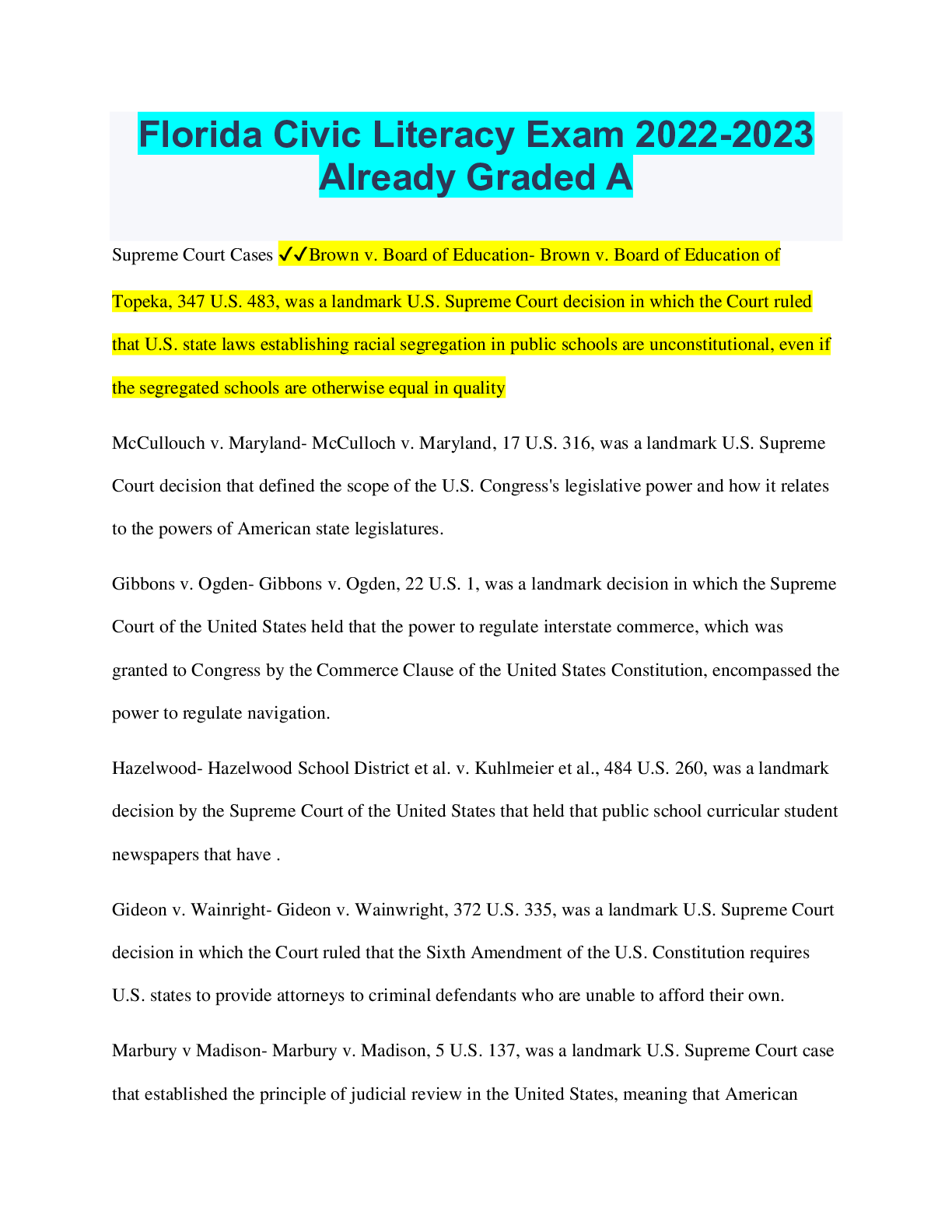
Buy this document to get the full access instantly
Instant Download Access after purchase
Buy NowInstant download
We Accept:

Reviews( 0 )
$10.00
Can't find what you want? Try our AI powered Search
Document information
Connected school, study & course
About the document
Uploaded On
Jun 07, 2023
Number of pages
7
Written in
Additional information
This document has been written for:
Uploaded
Jun 07, 2023
Downloads
0
Views
122

.png)

